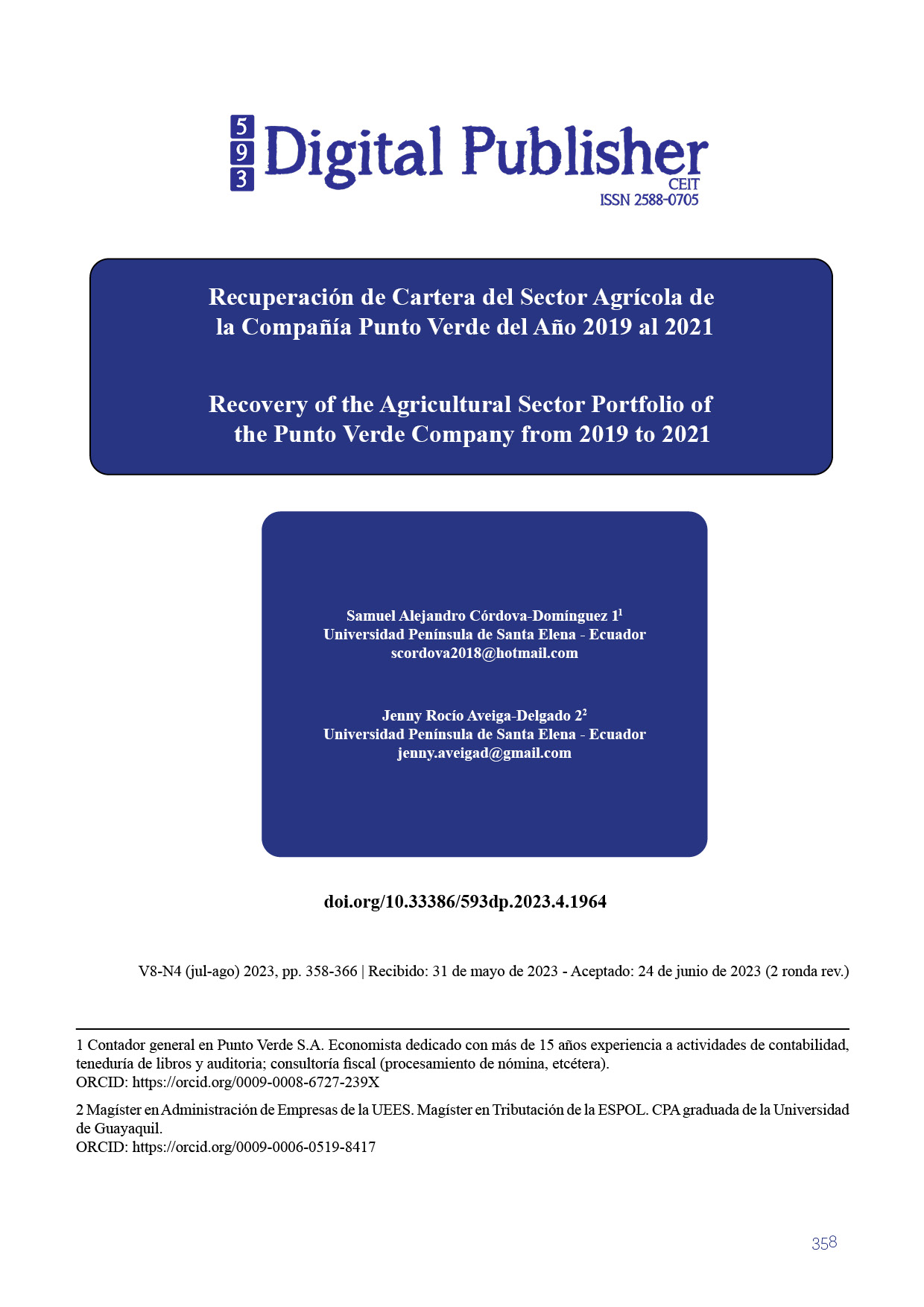Recovery of the agricultural sector portfolio of the Punto Verde Company from 2019 to 2021
Main Article Content
Abstract
The general objective of the research is: To analyze the recovery of the portfolio of the Punto Verde Company in the years 2019, 2020 and 2021. In the 2019 portfolio, it is evident that in the audit reports there is a value of approximately $ 1.5M, in which 60% of sales of the year are in portfolio receivable, given that the credit days are from 90 to 120 days. On the other hand, in 2020, the year in which the Covid-19 pandemic began, it increased to $1.9M, a significant increase to 72% of the receivable portfolio, appearing with it a bad debt portfolio, due to the closure of several businesses due to these factors. For the year 2021, this portfolio remained at $1.9M receivable, because not only did the pandemic contract the economy of this sector, but climate changes aggravated the financial situation of customers who had to delay payments of their accounts receivable from the company. The statistical method used is descriptive correlational in which the correlation coefficient of the variables is defined: portfolio receivable and the years of study 2019 to 2021 in addition to performing the statistical tests for the study hypothesis: The portfolio presents a growing state with respect to the evaluation period.
Downloads
Article Details

This work is licensed under a Creative Commons Attribution-NonCommercial-ShareAlike 4.0 International License.
1. Derechos de autor
Las obras que se publican en 593 Digital Publisher CEIT están sujetas a los siguientes términos:
1.1. 593 Digital Publisher CEIT, conserva los derechos patrimoniales (copyright) de las obras publicadas, favorece y permite la reutilización de las mismas bajo la licencia Licencia Creative Commons 4.0 de Reconocimiento-NoComercial-CompartirIgual 4.0, por lo cual se pueden copiar, usar, difundir, transmitir y exponer públicamente, siempre que:
1.1.a. Se cite la autoría y fuente original de su publicación (revista, editorial, URL).
1.1.b. No se usen para fines comerciales u onerosos.
1.1.c. Se mencione la existencia y especificaciones de esta licencia de uso.
References
Bermúdez Vera, I. M., Manotas Duque, D. F., Olaya Ochoa, J., Bermúdez Vera, I. M., Manotas Duque, D. F., & Olaya Ochoa, J. (2020). Modelo para la estimación del deterioro por riesgo de crédito. Suma de Negocios, 11(25), 149–157. https://doi.org/10.14349/SUMNEG/2020.V11.N25.A6
Ecovidal. (2017). POLITICAS Y PROCEDIMIENTOS DE CRÉDITOS COMERCIALES.
Fidias. (2012). El Proyecto de Investigación Introducción a la metodología científica (Editorial Episteme).
Gallardo-Echenique, E. (2017). Metodología de la Investigación: manual autoformativo interactivo. In Universidad Continental. Universidad Continental. http://www.continental.edu.pe/
García Lomas, V. A., & García Lomas, V. A. (2018). Análisis de la cartera de créditos de la banca pública ecuatoriana (2008-2017). Revista Científica UISRAEL, 5(3), 37–50. https://doi.org/10.35290/RCUI.V5N3.2018.76
Gómez-Luna, E., Fernando-Navas, D., Aponte-Mayor, G., Luis, &, & Betancourt-Buitrago, A. (2014). Literature review methodology for scientific and information management, through its structuring and systematization Metodología para la revisión bibliográfica y la gestión de información de temas científicos, a través de su estructuración y sistematización. DYNA, 81(184), 158–163. http://dyna.medellin.unal.edu.co/
Haro, D. M. L., Almeida, L. A. A., Mesías, J. P. M., & Chávez, M. A. M. (2022). The impact of crises on the performance of the Ecuadorian agricultural sector. Revista Finanzas y Politica Economica, 14(1), 167–186. https://doi.org/10.14718/revfinanzpolitecon.v14.n1.2022.7
Hernández, R., Fernández, C., & Baptista, M. (2014). Metodología de la Investigación: Vol. Sexta edición (M. Rocha, Ed.; McGRAW-HILL).
McCord, A. (2010). El impacto de la crisis financiera global en la protección social de los países en desarrollo. Revista Internacional de Seguridad Social, 63(2), 35–51. https://doi.org/10.1111/J.1752-1734.2010.01360.X
Mullo-Mora, M. (2021). Estrategias de Recuperación de Cartera. DGRV – Confederación Alemana de Cooperativas. https://www.seps.gob.ec/wp-content/uploads/Estrategias-recuperacion-cartera.pdf
OECD-FAO. (2020). OCDE-FAO Perspectivas Agrícolas 2020-2029. OECD Publishing. https://doi.org/10.1787/a0848ac0-es
Orellana-Osorio, I., Reyes, M. A., & Cevallos-Rodríguez, E. (2019). Evolución de los modelos para la medición del riesgo financiero. UDA AKADEM, 3. https://doi.org/10.33324/udaakadem.v1i3.201
Pineda Vicezar, E. B., Peña Cardozo, Á. R., Pineda Vicezar, E. B., & Peña Cardozo, Á. R. (2020). Calificación de riesgo crediticio en productores agrícolas en el Paraguay, año 2018. Revista Científica de La UCSA, 7(3), 47–58. https://doi.org/10.18004/UCSA/2409-8752/2020.007.03.047
Vásquez Villanueva, C. A., Terry Ponte, O. F., Huaman Tito, M. J., & Cerna Carrazco, C. S. (2021). Ratios de liquidez y cuentas por cobrar : análisis comparativo de las empresas del sector lácteo que cotizan en la bolsa de valores de Lima. Visión de Futuro, 25, No 2 (Julio-Dic), 195–214. https://doi.org/10.36995/J.VISIONDEFUTURO.2021.25.02R.006.ES
Vilca Mamani, C. R., & Torres-Miranda, J. S. (2021). Gestión del riesgo crediticio y el índice de morosidad en colaborares de una entidad financiera del departamento de Puno. Revista de Investigación Valor Agregado, 8(1). https://doi.org/10.17162/riva.v8i1.1632



